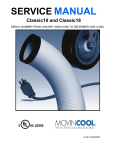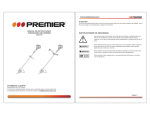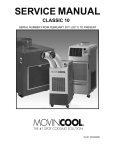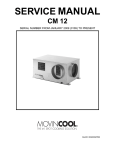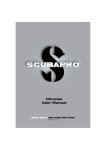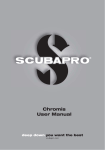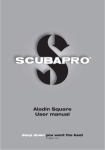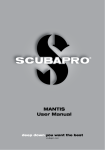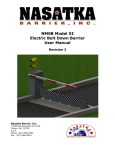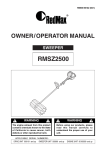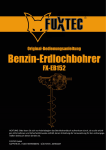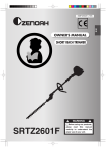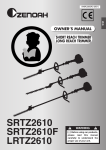Download CORTADORA DE CÉSPED
Transcript
MANUAL DE INSTRUCCIONES CORTADORA DE CÉSPED CGR-4603 ESTIMADO CLIENTE Con el fin de que obtenga el mayor desempeño de su producto, por favor lea este manual de instrucciones cuidadosamente antes de comenzar a utilizarlo, y guárdelo para su futura referencia. Si necesita soporte adicional, no dude en escribir a: [email protected] PRECAUCIÓN RIESGO DE CHOQUE ELÉCTRICO , NO ABRA Precaución: Para reducir el riesgo de choque eléctrico, no retire la cubierta, no hay partes manipulables por el usuario al interior de la unidad. Refiera todo mantenimiento o intervención técnica a personal técnico calificado. Este símbolo indica la existencia de voltaje peligroso al interior de esta unidad, que constituye un riesgo de choque eléctrico. Este símbolo indica que hay importantes instrucciones de operación y mantenimiento en la literatura que acompaña a esta unidad. LÍNEAS DE SERVICIO AL CLIENTE PREMIER Venezuela: Panamá: Sitio Web: E-mail: 0800 – ELECTRIC (353-2874) 300-5185 www.premiermundo.com [email protected] NOTA Nos reservamos el derecho de modificar las especificaciones, características y/u operación de este producto sin previo aviso, con el fin de continuar las mejoras y desarrollo del mismo. P-1 ÍNDICE PARTES DE LA UNIDAD ........................................................................................................................... 3! ESPECIFICACIONES ................................................................................................................................ 4! ETIQUETAS DE ADVERTENCIA .............................................................................................................. 5! SIMBOLOS EN LA CORTADORA DE CÉSPED ....................................................................................... 6! INSTRUCCIONES DE SEGURIDAD ......................................................................................................... 6! CONDICIONES PARA TRABAJAR CON LA UNIDAD ........................................................................... 7! PARA OPERAR CON SEGURIDAD .......................................................................................................... 8! ANTES DE ARRANCAR EL MOTOR ..................................................................................................... 9! USO DE LA UNIDAD ............................................................................................................................... 10! MANTENIMIENTO ................................................................................................................................... 11! RECARGA DE COMBUSTIBLE ........................................................................................................... 11! TRASLADANDO LA UNIDAD .................................................................................................................. 11! INSTALACIÓN DE LAS AGARRADERAS ........................................................................................... 12! INSTALACIÓN DEL PROTECTOR DE DESECHOS ........................................................................... 12! INSTALACIÓN DEL CABEZAL DE CORTE ......................................................................................... 12! COMBUSTIBLE........................................................................................................................................ 13! PRECAUCIÓN ...................................................................................................................................... 13! IMPORTANTE ...................................................................................................................................... 13! OPERACIÓN ............................................................................................................................................ 13! INICIAR EL MOTOR ............................................................................................................................. 14! DETENER EL MOTOR ......................................................................................................................... 15! AJUSTAR LA VELOCIDAD “NEUTRAL” .................................................................................................. 15! USO DEL CABEZAL DE CORTE............................................................................................................. 16! CORTAR PASTO Y MALEZA............................................................................................................... 16! AJUSTAR LA LONGITUD DE LA LÍNEA DE CORTE .......................................................................... 16! MANTENIMIENTO ................................................................................................................................... 16! RELLENAR LA LÍNEA DE CORTE ...................................................................................................... 17! FILTRO DE AIRE.................................................................................................................................. 18! FILTRO DE COMBUSTIBLE ................................................................................................................ 18! BUJÍA.................................................................................................................................................... 18! SILENCIADOR ..................................................................................................................................... 18! PARACHISPAS .................................................................................................................................... 18! ENTRADA DE VENTILACIÓN DEL ENFRIAMIENTO DE AIRE .......................................................... 18! PROCEDIMIENTOS QUE DEBE REALIZAR CADA 10 HORAS DE USO .......................................... 19! ALMACENAR LA UNIDAD ....................................................................................................................... 19! SOLUCIÓN DE PROBLEMAS ................................................................................................................. 20! P-2 PARTES DE LA UNIDAD 1. Manija 2. Correa de hombro 3. Interruptor de encendido 4. Cable del acelerador 5. Palanca del acelerador 6. Botón de ajuste del acelerador 7. Tubo 8. Bloqueador de desechos 9. Cuchilla 10. Cubierta del engranaje 11. Perilla de arranque 12. Tanque de combustible 13. Palanca del regulador de flujo 14. Cubierta del limpiador de aire 15. Bomba de cebado P-1 ESPECIFICACIONES Tipo de motor Enfriado por aire, de 2 tiempos a gasolina Desplazamiento 52cm3 Salida Máxima 2.4Hp en 7500 rpm Combustible Mezcla (Gasolina 25: Aceite 1) Carburador Tipo diafragma Capacidad del tanque de 0.65litros combustible Transmisión Embrague centrifugo, Cortador del eje de transmisión rígido Rotación del cortador En el sentido de las manecillas del reloj desde el punto de vista del usuario Dimensiones L 1900mm An 260mm Al 670mm Peso Neto 9.40kg Accesorios Cuchilla Cabezal de corte Kit de herramienta P-4 ETIQUETAS DE ADVERTENCIA 1. 2. 3. 4. 5. 6. 7. Leer el manual de instrucciones antes de utilizar la unidad Utilizar protector para los ojos y casco. Usar protección para los pies Usar guantes Tenga precaución con los objetos lanzados mientras trabaja. Atención / Advertencia Los niños, espectadores y ayudantes deben mantenerse a 15 metros de distancia de la cortadora de césped. Importante Si las etiquetas se despegan o se vuelven ilegibles, debe ponerse en contacto con el distribuidor del que adquirió el producto para solicitar nuevas etiquetas y volver a colocarlas en los lugares específicos. Advertencia! No modifique la cortadora de césped. No brindamos garantía a cortadoras que hayan sido modificadas o si no ha seguido las instrucciones de operación descritas en el presente manual. P-1 SÍMBOLOS EN LA CORTADORA DE CÉSPED Para una operación segura y mantenimiento, se ha colocado símbolos en relieve en la cortadora de césped. Asegúrese de no cometer errores prestando atención a los mismos. Boquete para cargar la mezcla de gasolina. Ubicación: Tapa del tanque de combustible Sentido en el que se debe cerrar el regulador de flujo. Ubicación: Tapa del filtro de aire Esta unidad esta diseñada para ser usada con cortadora de línea flexible. No use la unidad con cortadoras hechas de metal o plástico. Posición: Bloqueador de desechos INSTRUCCIONES DE SEGURIDAD 1. Lea atentamente este manual, entienda su contenido y siga todas las normas de seguridad antes de utilizar este aparato. 2. Conserve este manual para futuras referencias. Así mismo, si tuviese pregunta que no responde este manual, póngase en contacto con el distribuidor. 3. Asegúrese de adjuntar este manual si vende o presta este producto. 4. No permita que este aparato sea utilizado por niños o personas que no sean capaces de entender claramente el contenido de este manual. P-6 CONDICIONES PARA TRABAJAR CON LA UNIDAD 1. Cuando use esta unidad debe vestir indumentaria de seguridad y equipo de protección. (1) Casco (2) Orejeras (3) Lentes o protector de rostro (4) Guantes gruesos de trabajo (5) Botas con suelas antideslizantes 2. Ud. debería portar (1) Las herramientas y archivos adjuntos (2) Combustible de reserva adecuadamente almacenado (3) Hoja de repuesto (4) Elementos para demarcar su área de trabajo (soga, señales de precaución) (5) Silbato (para pedir ayuda en caso de emergencia) (6) Hacha o sierra (para retirar obstáculos) 3. No utilice ropa suelta, joyas, pantalones cortos, sandalias, no vaya descalzo. No use nada que pueda ser atrapado por una parte móvil de la unidad. Asegure bien el cabello, de forma que esté por encima de la altura de los hombros. P-1 PARA OPERAR CON SEGURIDAD Circunstancia de trabajo 1. Nunca arranque el motor en un recinto o construcción cerrada. Los gases de escape contienen el monóxido de carbono en niveles peligrosos. 2. Nunca utilice el producto, a) Cuando el terreno sea resbaloso o cuando usted no pueda mantener una postura estable. b) Por la noche, en presencia de niebla espesa, o en cualquier otro momento cuando su campo de visión se viera limitado y fuese dificultoso obtener una visión clara del área de trabajo. c) Durante tormentas de lluvia, durante tormentas eléctricas o vientos huracanados en cualquier oportunidad en que las condiciones del clima puedan hacer inseguro el uso del producto. Plan de trabajo 1. Usted no debería usar el producto cuando se encuentre bajo la influencia del alcohol, cuando se encuentre exhausto o sin dormir, cuando sufra de mareos como resultado de haber tomado medicamento para el resfrío o en cualquier circunstancia en que exista la posibilidad de que su juicio pudiese verse debilitado. 2. Al organizar su plan de trabajo, permítase incluir un tiempo para descanso. Limite el tiempo de uso continuo de la cortadora a un promedio de 30 a 40 minutos por sesión y descanse 10 a 20 minutos entre cada una. Así mismo intente no trabajas más de dos horas por día. CUIDADO 1. Si no toma en cuenta los tiempos de trabajo recomendados o los métodos de trabajo que se indican, podría sufrir daños por estrés reiterado. Si no se siente bien, con rubor o se hinchan sus dedos o cualquier otra parte de su cuerpo, consulte un médico antes de sentirse más afectado. 2. Para evitar molestias causadas por el ruido, trabaje entre la 8.00am y las 5.00pm en días laborales y entre las 9.00am y las 5.00pm los fines de semana. NOTA: Tome en cuenta las normas locales respecto a los niveles de ruido y horas de trabajo antes de usar la cortadora. P-8 ANTES DE ARRANCAR EL MOTOR 1. El área que comprende los 15 metros a la redonda de la persona que está realizando el trabajo es considerada riesgosa, por lo que nadie deberá asomarse. De ser necesario, extienda una franja de seguridad amarilla en el perímetro. Cuando el trabajo vaya a ser realizado simultáneamente por dos o más personas, observe constantemente alrededor para asegurarse de que las demás personas no se encuentren cerca y mantenga una distancia suficientemente segura. 2. Revise las condiciones del área de trabajo para asegurarse de que no existan obstáculos como piedras, hoyos, palos o ramas. IMPORTANTE Retire cualquier obstáculo antes de empezar el trabajo. 3. Revise completamente la cortadora de césped en búsqueda de tornillos sueltos o fugas de combustible. Asegúrese de que las cuchillas estén correctamente colocadas y bien sujetas. 4. Asegúrese de que el protector de desechos esté en su lugar y firmemente sujeto. 5. Use siempre la abrazadera. Ajústela antes de arrancar el motor. La correa puede ser cómodamente ajustada en su mano izquierda para alcanzar una altura cómoda. ARRANCANDO EL MOTOR 1. Los animales y transeúntes deben mantenerse al menos a 15 metros de distancia del punto de operación. Si alguien se acerca, detenga el motor de inmediato. 2. El producto está equipado con un mecanismo de embrague centrífugo, por lo que las cortadoras comienzan a girar en cuanto el motor es arrancado colocando el acelerador en la posición de ignición. Cuando arranque el motor coloque el aparato en el suelo un área plana y expedita, sosténgalo firmemente en su lugar de tal manera que las partes cortantes no entren en contacto con nada. CUIDADO Nunca coloque el acelerador a velocidad máxima al arrancar el motor. 3. Una vez encendido el motor, asegúrese de que las cortadoras dejan de girar cuando regrese el acelerador a su posición original. Si las mismas continúan girando, apague el motor y lleve el aparato a su distribuidor para que este sea revisado. P-1 USO DE LA UNIDAD IMPORTANTE Corte únicamente los materiales indicados para este producto y realice únicamente las tareas especificadas en este manual. 1. Sostenga firmemente las agarraderas con ambas manos. Pise firmemente manteniendo sus pies separados (aproximadamente un poco más que la distancia de sus hombros) de tal modo que el peso de su cuerpo quede bien distribuido en sus dos piernas y asegúrese de mantenerse firme en una posición adecuada para el trabajo. 2. Mantenga la cortadora debajo de la altura de su cintura. 3. Mantenga la velocidad del motor en el nivel adecuado y no aumente la velocidad más allá del lo necesario. 4. Si el aparato comienza a vibrar, apague el motor y revise toda la cortadora de césped. No vuelva a usarla hasta que el problema haya sido resuelto. 5. Mantenga su cuerpo lejos de las cuchillas y de las superficies calientes. 6. No toque el silenciador, la bujía u otras partes metálicas del motor mientras este esté en funcionamiento o inmediatamente después de apagarlo. Caso contrario podría quemarse o recibir descargas eléctricas. SI ALGUIEN SE ACERCA 1. Evite siempre cualquier situación de riesgo. Recomiende a los adultos mantener a las mascotas y los niños lejos del área. Tenga cuidado si se encuentra cerca, pues puede resultar lastimado por los restos que se cortan. 2. Si alguien lo llama o lo interrumpe mientras esté trabajando, asegúrese de apagar el motor antes de voltearse. P-10 MANTENIMIENTO 1. Con el fin de mantener el producto funcionando en buenas condiciones, realice el mantenimiento y las revisiones periódicas que se describen en el presente manual. 2. Asegúrese de apagar el motor antes de realizar cualquier mantenimiento y revisión. ATENCIÓN Las partes metálicas alcanzan altas temperaturas incluso después de haber apagado el motor. 3. Cuando remplace las cuchillas u otras partes o bien el combustible o lubricante, asegúrese de que el motor esté apagado. 4. En el caso de que cualquier parte deba ser remplazada o reparada póngase en contacto con su distribuidor o con un centro de servicio técnico autorizado. 5. No utilice ningún accesorio o complemento que no esté recomendado específicamente para este aparato. 6. Bajo ninguna circunstancia deberá desarmar o modificar el producto. Esto podría resultar en daños durante la operación o en fallas de funcionamiento. RECARGA DE COMBUSTIBLE 1. El motor está diseñado para funcionar con una mezcla que contiene gasolina altamente inflamable. No almacene recipientes de combustible o llene el tanque en lugares donde hayan hogueras, estufas, cocinas, chispas eléctricas, o cualquier otra fuente de calor o fuego ya que podría encender el combustible. 2. No fume mientras utilice el aparato o esté llenando el tanque de combustible. 3. Apague el motor antes de llenar el tanque de combustible y espere a que este se enfríe. Observe alrededor para asegurarse de que no existan chispas o llamas cerca. 4. Limpie cualquier salpicadura de combustible que haya quedado después de cargar el tanque, usando un paño seco. 5. Después de llenar el tanque vuelva a ajustar la tapa del mismo y lleve el aparato a unos 10 metros de distancia del lugar donde fue cargado el tanque antes de encender el aparato. TRASLADANDO LA UNIDAD 1. Cuando termine de cortar el césped en un sitio y desee continuar en otro, apague el motor, levante el aparato y cárguelo cuidando la cortadora. 2. No transporte el aparato en caminos sinuosos en vehículos sin antes retirar el combustible del tanque, caso contrario el mismo podría derramarse. P-1 INSTALACIÓN DEL TUBO Monte el tubo al motor y apriete los tornillos. Asegúrese que los tornillos insertados en el centro este colocados de manera correcta. INSTALACIÓN DE LAS AGARRADERAS • Monte las agarraderas, el eje y la abrazadera en una posición cómoda para usted. INSTALACIÓN DEL PROTECTOR DE DESECHOS • Coloque el protector en la cubierta de rodamiento, ajústelo con el tornillo, la arandela, tuerca y la placa de soporte. INSTALACIÓN DEL CABEZAL DE CORTE • • Mientras bloquea el engranaje del eje insertando la barra hexagonal en el soporte superior y la cubierta. Rote el cabezal de corte para enganchar las roscas. Ajústelo de manera segura P-12 COMBUSTIBLE PRECAUCIÓN • • • • Evite fumar o que fuego o chispas estén cerca del combustible. Limpie cualquier derrame de combustible antes de encender el motor. Apague el motor de la unidad y espere hasta que se enfríe antes de echar el combustible. Evite usar o almacenar la unidad cerca de llamas o chispas. IMPORTANTE • • • • • • Evite usar aceite para motor de 4 tiempos, use o agua fría o aceite para motor de dos tiempos. No use combustible sin aceite (Gasolina cruda) No use combustible mezclado con agua Combustible mezclados que no han sido utilizados por un mes o mas, pueden obstruir el carburador y ocasionar que el motor no funcione de una manera apropiada. Ponga el combustible restante en un contenedor hermético y manténgalo en un lugar oscuro y fresco. Mezcle gasolina en grado regular (Con plomo o sin plomo, libre de alcohol) y un aceite de motor de dos tiempos calificado. Recomendación en la mezcla de gasolina 25: Aceite 1. El aceite debe ser especial para motor de dos tiempos. (160ml de aceite por cada 4 litro de gasolina) OPERACIÓN ARNÉS • • • Advertencia! Use siempre el arnés suministrado cuando use la unidad. Asegúrese siempre que la unidad este bien conectada con el arnés. De lo contrario, usted no podrá manejar la unidad de forma segura, y esto puede provocar accidentes. No use nunca un arnés con un mecanismo de liberación rápida dañado ó cualquier otra pieza. COMO USARLO Colóquese el arnés suministrado sin las bandas cruzadas, con el colgador en su lado derecho. (1) Colgador P-1 BALANCEAR LA UNIDAD • • • • Conecte la unidad con el cargador Ajuste el alto de las bandas del arnés, de tal forma que la cuchilla de corte de la unidad quede paralela al suelo. Con el fin de prevenir cambiar la posición del colgador durante la operación de la unidad, gire la parte extra de la banda desde la hebilla. Cuando este correctamente ajustado, verifique que el sistema de liberación rápida funcione correctamente. MECANISMO DE LIBERACIÓN RÁPIDA El arnés esta equipado con un mecanismo de liberación rápido. Para liberar la unidad del arnés en caso de emergencia, siga el siguiente procedimiento. Advertencia! • Asegúrese de revisar que el mecanismo de liberación rápida funciona correctamente antes de usar la unidad. • Asegúrese de sostener la unidad de manera segura cuando use el mecanismo de liberación rápida. Cuando sostenga la unidad con su mano derecha de manera segura, presione botón rojo de la hebilla. Luego, retire el arnés de sus hombros. (1) Hebilla INICIAR EL MOTOR Advertencia! El cabezal de corte empieza a girar inmediatamente después de encender la unidad • • • Ubique la unidad en un lugar plano y asegúrese que la cabeza de la cuchilla esta totalmente libre de objetos a su alrededor. Empuje la bomba cebadora algunas veces hasta que el combustible fluya en el tubo de retorno. Mueva la palanca reguladora de flujo a la posición Cerrado (OP2). (1). Palanca reguladora de flujo A. Posición “Cerrado” B. Posición “Abierto” P-14 el • Ajuste el interruptor de ignición en la posición de arranque (OP3). (1). Interruptor de ignición (2). Detener (3). arranque • Mientras sostiene la unidad firmemente hale la cuerda de arranque rápidamente hasta que el motor encienda. (OP4) IMPORTANTE: Evite halar la cuerda de arranque hasta su fin, o devolverla al liberar la perilla, ya que esto puede dañar la cuerda de arranque. • Mueva la palanca reguladora de flujo a la posición “Abrir” y hale la cuerda de arranque para encender el motor. • Permita que el motor se caliente algunos minutos antes de iniciar la operación. NOTA: • Si va a volver a arrancar el motor de la unidad inmediatamente después de haberlo parado, mueva la palanca reguladora de flujo a la posición “Abrir” y presione la bomba de cebado algunas veces. • Un motor inundado puede ser difícil de arrancar debido al exceso de combustible. Cuando el motor no encienda después de varios intentos, abra la palanca reguladora de flujo y hale la cuerda de arranque ó remueva la bujía y séquela. DETENER EL MOTOR • • Libere la palanca de aceleración y permita que el motor funcione durante medio minuto. Cambie el interruptor de ignición a la posición “Detenido”. NOTA: Excepto en casos de emergencias, evite detener el motor mientras presione la palanca de aceleración. AJUSTAR LA VELOCIDAD “NEUTRAL” Cuando necesite detener frecuentemente el motor en velocidad Neutral, gire el tornillo de ajuste. • Cuando el cabezal de corte continúe girando después de liberar la palanca de aceleración, gire el tornillo. NOTA: Caliente el motor antes de ajustar la velocidad neutral. • P-1 USO DEL CABEZAL DE CORTE Advertencia! • Use siempre gafas y guantes protectores, ya que los desechos ó rocas pueden golpearlo y causar serias lesiones. • Mantenga siempre el protector de desechos en su lugar mientras este operando la unidad. CORTAR PASTO Y MALEZA • Recuerde siempre cortar con la punta de la línea de corte. Obtendrá mejores resultados si no introduce toda la línea de corte en el área. Permita que la unidad trabaje a su propio ritmo. 1. Sostenga la unidad cuidando que el cabezal de corte no este cerca del suelo 2. Puede evitar golpes por desechos si mueve la unidad de derecha a izquierda. 3. Use una velocidad baja para corta vegetación pesada. La velocidad del corte dependerá del material que esta siendo cortado. Vegetación pesada necesita una menor velocidad de corte. 4. No mueva la unidad muy rápido, ya que puede perder el balance ó el control de la misma. 5. Trate de controlar la unidad con la cadera y no con sus manos y brazos. 6. Tenga precaución y evite que cables, hierva muerta y seca se enrolle alrededor del eje del cabezal, ya que tales materiales pueden detener el cabezal y causar que el embrague se deslice. Esto podría dañar el sistema de embrague si se repite con mucha frecuencia. AJUSTAR LA LONGITUD DE LA LÍNEA DE CORTE • • Esta unidad esta equipada con una línea de nylon tipo semi-automática, lo cual permite que el operador avance la línea sin detener el motor. Cuando la línea esta muy corta, golpee suavemente el cabezal en la tierra con el motor completamente acelerado Cada vez que el cabezal es golpeado, la línea avanza 1” (25.4mm). para mejores resultados golpee suavemente el cabezal sobre tierra dura. Evite golpearlo en tierra gruesa, ya que el motor puede detenerse por sobrecarga. MANTENIMIENTO Remita todo mantenimiento ó reparación a personal de servicio técnico calificado. Advertencia! • Asegúrese siempre de detener el motor y que la unidad se encuentre completamente fría antes de revisarla o de realizarle mantenimiento • No altere la unidad ni retire su motor • Verifique que todo este en su lugar antes de usar la unidad. P-16 RELLENAR LA LÍNEA DE CORTE P-1 FILTRO DE AIRE Si el filtro de aire se encuentra obstruido, puede disminuir el rendimiento del motor. Revise y limpie mensualmente el elemento del filtro con agua tibia y jabonosa. Séquelo por completo antes de colocarlo nuevamente. Si el elemento se encuentra roto o reducido reemplácelo por uno nuevo. (MA1) FILTRO DE COMBUSTIBLE Cuando el motor se queda sin suministro de combustible, revise la tapa de combustible y el filtro para evitar bloqueos. (MA2) BUJÍA Fallas en el arranque y mal funcionamiento es a menudo causado por una falla en la bujía. Limpie la bujía periódicamente y verifique que esta se encuentre en el rango correcto. (MA3) Importante: • El uso de una bujía que no corresponda con la proporcionada, puede provocar fallas en el funcionamiento del motor o sobrecalentamiento y daños. • Para instalar la bujía, primero gire el enchufe hasta que quede apretado, luego apriételo un cuarto mas con una llave de tubo. Torsión de presión: 9.8~11.8N.m SILENCIADOR Advertencia! • Revise el silenciador periódicamente en busca de piezas flojas o perdidas, dañadas ó corroídas. Si encuentra alguna anomalía o daño, no use la unidad y remítala de inmediato a un centro de servicio autorizado PARACHISPAS El silenciador esta equipado con un parachispas, el cual previene que el carbón caliente salga por la salida de escape. Revíselo periódicamente y límpielo de ser necesario con un cepillo de alambre. (MA5) ENTRADA DE VENTILACIÓN DEL ENFRIAMIENTO DE AIRE • • Advertencia! No toque le cilindro, silenciador ó la bujía inmediatamente después de haber apagado la unidad, ya que puede sufrir serias lesiones. Verifique siempre que la unidad esta libre de desechos y astillas de madera antes de su uso. P-18 Revise la entrada de ventilación del enfriamiento de aire y el área alrededor de las aletas de enfriamiento del cilindro cada 25 horas de uso, con el fin de evitar bloqueos. Retire la protección del enchufe si es necesario con lo indica la figura (MA4), con el fin de tener una mejor visibilidad de la parte superior del cilindro. Importante: Si los desechos están obstruyendo la entrada de ventilación del enfriamiento de aire o alrededor de las aletas del cilindro, puede sobrecalentarse el motor, y causar fallas mecánicas en la unidad. • PROCEDIMIENTOS QUE DEBE REALIZAR CADA 10 HORAS DE USO 1. Remueva el silenciador, inserte un destornillador en la ventilación y limpie la acumulación de carbón. Limpie además la acumulación de carbón el la ventilación de escape del silenciador. 2. Ajuste los tornillos, pernos y piezas. 3. Revise si hay aceite o grasa en medio del recubrimiento del embrague o el tambor, y límpielo de ser necesario usando gasolina libre de plomo. ALMACENAR LA UNIDAD • • Almacenar combustible por mucho tiempo puede causar problemas al arrancar la unidad. Antes de almacenar la unidad, vacíe el tanque de combustible y encienda el motor hasta que se consuma toda la reserva de combustible del tanque. Guarde la unidad en un lugar seco y limpio. P-1 SOLUCIÓN DE PROBLEMAS Caso 1: Fallas al encender la unidad Revisar Posibles causas Tanque de combustible Combustible incorrecto Posible solución Llénelo con el combustible correcto y la mezcla recomendada Filtro de combustible El filtro de combustible esta Límpielo bloqueado Tornillo de ajuste del Esta fuera del rango normal Ajústelo al rango norman carburador Chispas (No hay La bujía esta mojada ó Límpiela ó séquela chispas) sucia La brecha debe ser de: 0.6~0.7mm La brecha de la bujía no es la correcta Bujía Desconectada Vuelva a apretarla Caso 2: el motor enciende pero no tiene un funcionamiento continuo / es difícil re-iniciarlo Revisar Posibles causas Posible solución Tanque de combustible Combustible incorrecto Llénelo con el combustible correcto y la mezcla recomendada Silenciador, cilindro, El carbón esta acumulado Retírelo (puerto de escape) Tornillo de ajuste del Esta fuera del rango normal Ajústelo al rango norman carburador Limpiador de aire Obstruido Lávelo Aletas del cilindro Obstruidas Límpielas P-20 INSTRUCTION MANUAL BRUSH CUTTER CGR-4603 DEAR CUSTOMER In order to achieve the best performance of your product, please read this instruction manual carefully before using, and keep it for future reference. If you need extra support, please write to [email protected] PREMIER CUSTOMER SERVICE Venezuela: Panama: Website E-mail: 0800 – ELECTRIC (353-2874) 300-5185 www.premiermundo.com [email protected] NOTE This unit may be submitted to changes in specifications, characteristics and/or operation without prior notice to the user, in order to continue improving and developing its technology. P-1 SAFETY FIRST Instructions contained in warnings within this manual marked with a symbol concern critical points which must be taken into consideration to prevent possible serious bodily injury, and for this reason you are requested to read all such instructions carefully and follow them without fail. ! WARNINGS IN THE MANUAL WARNING This mark indicates instructions which must be followed in order to prevent accidents which could lead to serious bodily injury or death. IMPORTANT This mark indicates instructions which must be followed, or it leads to mechanical failure, breakdown, or damage. NOTE This mark indicates hints or directions useful in the use of the product. CONTENTS 1. Parts location !!!!!!!!!!!!!!!!!!!!!!!!!!!!!!!!!!!!!!3 2. Specifications !!!!!!!!!!!!!!!!!!!!!!!!!!!!!!!!!!!!!!4 3. Warning labels on the machine !!!!!!!!!!!!!!!!!!!!!!!!!!!!!!4 4. Symbols on the machine !!!!!!!!!!!!!!!!!!!!!!!!!!!!!!!!!5 5. For safe operation !!!!!!!!!!!!!!!!!!!!!!!!!!!!!!!!!!!!5 6. Set up!!!!!!!!!!!!!!!!!!!!!!!!!!!!!!!!!!!!!!!!!12 7. Fuel!!!!!!!!!!!!!!!!!!!!!!!!!!!!!!!!!!!!!!!!!!13 8. Operation !!!!!!!!!!!!!!!!!!!!!!!!!!!!!!!!!!!!!!!14 9. Maintenance !!!!!!!!!!!!!!!!!!!!!!!!!!!!!!!!!!!!!!18 10. Storage !!!!!!!!!!!!!!!!!!!!!!!!!!!!!!!!!!!!!!!21 11. Troubleshooting guide!!!!!!!!!!!!!!!!!!!!!!!!!!!!!!!!!21 P-2 !" #$%&'()*+$&,*-(( ----------------------------------------------------------------------------------------------------------------------------------------- 1. Handle 9. Blade 2. Shoulder strap hanger 10. Gear case 3. Ignition switch 11. Starter knob 4. Throttle cable 12. Fuel tank 5. Throttle lever 13. Choke lever 6. Throttle set button 14. Air cleaner cover 7. Pipe 15. Primer pump 8. Debris Guard P-1 !" #$%&'('&)*'+,-.. --------------------------------------------------------------------------------------------------------------------------------------Overall size (LxWxH).......................................................................................................1900x670x260mm Net weight ........................................................................................................................................9.40kg Engine Type.................................................................................................... Air-cooled 2-stroke gasoline Model..........................................................................................................................................CGR-4603 Displacement......................................................................................................................................52cm3 Max. output.................................................................................................................... 2.4Hp at 7500 rpm Fuel ................................................................................................................. Mixture (Gasoline 25: Oil 1) Carburetor .........................................................................................................................Diaphragm type Fuel tank capacity................................................................................................................................0.65L Transmission..............................................................................Centrifugal clutch, Rigid driveshaft Cutting Head rotating direction....................................................................... Clockwise (Operator view) Standard Accessories Line Head .............................................................................................................................................1 pc Blade ................................................................................................................................................. 1 pc Tool set................................................................................................................................................1 set Specifications are subject to change without notice. ." /$%-,-0()$12)'(*-(&32(4$+3,-2(( ----------------------------------------------------------------------------------------------------------------------------------------(1) (2) (3) (4) (5) (6) (7) (1) Read owner's manual before operating machine. (2) Wear head, eye and ear protection. (3) Wear foot protection. (4) Wear gloves. (5) Beware of thrown objects. (6) Warning / Attention (7) Keep all children, bystanders and helpers 15 meters away from the brush cutter IMPORTANT If warning label peel off or become soiled and impossible to read, you should contact the dealer from which you purchased the product to order new labels and affix them in the required location(s). WARNING Never modify your brush cutter. We won't warrant the machine, if you use the remodeled brush cutter or you don't observe the proper usage written in the manual. P-1 5" 6741*)'(*-(&32(4$+3,-2(( ----------------------------------------------------------------------------------------------------------------------------------------For safe operation and maintenance, symbols are carved in relief on the machine. According to these indications, please be careful not to make a mistake. (a) The port to refuel the "MIX GASOLINE" Position: FUEL TANK CAP (b) The direction A to close the choke The direction B to open the choke Position: AIR CLEANER COVER (c) This unit is fitted with only flexible line cutter. Never use cutting made of metal or plastic. blade Position: DEBRIS GUARD 8" 9*%('$:2(*;2%$&,*-(( ----------------------------------------------------------------------------------------------------------------------------------------1. Read this manual carefully until you completely understand and follow all safety and operating instructions. 2. Keep this manual handy so that you may refer to it later whenever any questions arise. Also note, if you have any questions which cannot be answered herein, contact the dealer from whom you purchased the product. 3. Always be sure to include this manual when selling, lending, or otherwise transferring the ownership of this product. 4. Never allow children or anyone unable to fully understand the directions given in the manual to use the machine. WORKING CONDITION 1. When using the product, you should wear proper clothing and protective equipment. (1) Helmet P-2 (2) Ear protectors (3) Protection goggles or face protector (4) Thick work gloves (5) Non-slip-sole work boots 2. And you should carry with you. (1) Attached tools and files (2) Properly reserved fuel (3) Spare blade (4) Things to notify your working area (rope, warning signs) (5) whistle (for collaboration or emergency) (6) Hatchet or saw (for removal of obstacles) 3. Do not wear loose clothing, jewelry, short trousers, sandals, or go barefoot. Do not wear anything which might be caught by a moving part of the unit. Secure hair so it is above shoulder length. WORKING CIRCUMSTANCE 1. Never start the engine inside a closed room or building. Exhaust gases contain dangerous carbon monoxide. 2. Never use the product, a. when the ground is slippery or when you can’t maintain a steady posture. b. At night, at times of heavy fog, or at any other times when your field of vision might be limited and it would be difficult to gain a clear view of the working area. c. During rain storms, during lightning storms, at times of strong or gale-force winds, or at any other times when weather conditions might make it unsafe to use the product. P-1 WORKING PLAN 1. You should never use the product when under the influence of alcohol, when suffering from exhaustion or lack of sleep, when suffering from drowsiness as a result of having taken cold medicine or at any other time when a possibility exists that your judgment might be impaired or that you might not be able to operate the product properly and in a safe manner. 2. When planning your work schedule, allow plenty of time to rest. Limit the amount of time over which the product is to be used continuously to somewhere around 30~40 minutes per session, and take 10~20 minutes of rest between work sessions. Also try to keep the total amount of work performed in a single day under 2 hours or less. WARNING 1. If you don t observe the working time, or working manner (See USING THE PRODUCT), Repetitive Stress Injury (RSI) could occur. If you feel discomfort, redness and swelling of your fingers or any other part of your body, see a doctor before getting worse. 2. To avoid noise complaints, in general, operate product between 8a.m. and 5p.m. on weekdays and 9a.m. to 5p.m. weekends. NOTE Check and follow the local regulations as to sound level and hours of operations for the product. P-2 BEFORE STARTING THE ENGINE 1. The area within a perimeter of 50 feet (15m) of the person using the product should be considered a hazardous area into which no one should enter. If necessary, yellow warning rope, warning signs should be placed around the perimeter of the area. When work is to be performed simultaneously by two or more persons, care should also be taken to constantly look around or otherwise check for the presence and locations of other people working so as to maintain a distance between each person sufficient to ensure safety. 2. Check the condition of working area to avoid any accident by hitting hidden obstacles such as stumps, stones, cans, or broken grass. IMPORTANT Remove any obstacle before beginning work. 3. Inspect the entire unit for loose fasteners and fuel leakage. Make sure that the cutting attachment is properly installed and securely fastened. 4. Be sure the debris guard is firmly attached in place. 5. If the cutting head is the metal blade, use the shoulder strap. Adjust the strap for comfort before starting the engine. The strap should be adjusted so the left hand can comfortably hold the handlebar grip approximately waist high. STARTING THE ENGINE 1. Keep bystanders and animals at least 50feet (15m) away from the operating point. If you are approached, immediately stop the engine. P-1 2. The product is equipped with a centrifugal clutch mechanism, so the cutting attachment begins to rotate as soon as the engine is started by putting the throttle into the start position. When starting the engine, place the product onto the ground in a flat clear area and hold it firmly in place so as to ensure that neither the cutting part nor the throttle come into contact with any obstacle when the engine starts. WARNING Never place the throttle into the high speed position when starting the engine. 3. After starting the engine, check to make sure that the cutting attachment stops rotating when the throttle is moved fully back to its original position. If it continues to rotate even after the throttle has been moved fully back, turn off the engine and take the unit to your authorized servicing dealer for repair. USING THE PRODUCT IMPORTANT Cut only materials recommended by the manufacturer. And use only for tasks explained in the manual. 1. Grip the handles firmly with both hands using your whole hand. Place your feet slightly apart (slightly further apart than the width of your shoulders) so that your weight is distributed evenly across both legs, and always be sure to maintain a steady, even posture while working. 2. Keep cutting attachment below waist level. 3. Maintain the speed of the engine at the level required to perform cutting work, and never raise the speed of the engine above the level necessary. 4. If the unit start to shake or vibrate, turn off the engine and check the whole unit. Do not use it until the trouble has been properly corrected. P-4 5. Keep all parts of your body away from rotating cutting attachment and hot surfaces. 6. Never touch the muffler, spark plug, or other metallic parts of the engine while the engine is in operation or immediately after shutting down the engine. Doing so could result in serious burns or electrical shock. IF SOMEONE COMES 1. Guard against hazardous situations at all times. Warn adults to keep pets and children away from the area. Be careful if you are approached. Injury may result from flying debris. 2. If someone calls out or otherwise interrupts you while working, always be sure to turn off the engine before turning around. MAINTENANCE 1. In order to maintain your product in proper working order, perform the maintenance and checking operations described in the manual at regular intervals. 2. Always be sure to turn off the engine before performing any maintenance or checking procedures. WARNING The metallic parts reach high temperatures immediately after stopping the engine. 3. Under no circumstances should you ever take apart the product or alter it in any way. Doing so might result in the product becoming damaged during operation or the product becoming unable to operate properly. P-1 HANDLING FUEL 1. The engine of the product is designed to run on a mixed fuel which contains highly flammable gasoline. Never store cans of fuel or refill the tank of the unit in any place where there is a boiler, stove, wood fire, electrical sparks, welding sparks, or any other source of heat or fire which might ignite the fuel. 2. Never smoke while operating the unit or refilling its fuel tank. 3. When refilling the tank, always turn off the engine and allow it to cool down. Take a careful look around to make sure that there are no sparks or open flames anywhere nearby before refueling. 4. Wipe spilled fuel completely using a dry rag if any fuel spillage occurs during refueling. 5. After refueling, screw the fuel cap back tightly onto the fuel tank and then carry the unit to a spot 10feet (3m) or more away from where it was refueled before turning on the engine. TRANSPORTATION 1. When hand-carrying the product, cover over the cutting part if necessary, lift up the product and carry it paying attention to the blade. 2. Never transport the product over rough roads over long distances by vehicle without removing all fuel from the fuel tank. If doing so, fuel might leak from the tank during transport. P-6 <"(62&(=;(( ---------------------------------------------------------------------------------------------------------------------------------------- INSTALLING PIPE ! Mount the pipe to the engine and tighten the screws. Be sure that the screw in the middle inserts rightly in the hole on pipe. INSTALLING HANDLE HOLDER ! Mount the handle holder to the pipe, approximately 5 to 7 cm from the hanger. INSTALLING HANDLE Mount the handle to the shaft tube and clamp it at your best operating position. INSTALLING DEBRIS GUARD Put the debris guard on the bearing case, attach it with the screw, washer, nut and support plate provided. (1) Support plate INSTALLING CUTTING HEAD 1. While locking the gear shaft by inserting the attached hexagon bar into the upper holder and the housing. 2. Rotate the cutting head to engage threads. Hand tightens it securely. P-1 >"( 9=2)(( -----------------------------------------------------------------------------------------------------------------------------------------WARNING Gasoline is very flammable. Avoid smoking or bringing any flame or sparks near fuel. Wipe up all spills before starting the engine. Make sure to stop the engine and allow it cool before refueling the unit. Keep open flames away from the area where fuel is handled or stored. IMPORTANT Never use oil for 4 cycle engine use or water cooled 2-cycle engine. Never use "FUEL WITH NO OIL (RAW GASOLINE)". Never use fuel laced with water. Mixed fuels which have been left unused for a period of one month or more may clog the carburetor or result in the engine failing to operate properly. Put remained fuel into an airtight container and keep it in the dark and cool room. Please ask for “mixed gasoline for air-cooled 2-cycle engines” at your nearest gas station, or use fuel made by putting unleaded gasoline for automobiles and air-cooled 2-cycle engine oil into a mixing container in accordance with the following ratios and then shaking to mix well. Mixing ratios: When using commercially available 2-cycle oil (FB grade): 25:1 (160 ml of oil for every 4 liters of gasoline) NOTE Please use 90# gasoline and oil. P-1 ?"(@;2%$&,*-(( ----------------------------------------------------------------------------------------------------------------------------------------HARNESS WARNING ALWAYS WEAR THE PROVIDED HARNESS WHEN USING THE MACHINE! Always make sure the machine is hooked securely to the harness. If you don't, you will be unable to control the machine safely. This can result in injury to yourself or others. Never use a harness with a defective quick release or any other damage. HOW TO WEAR 1. Wear the provided harness without twisted bands, with the hanger on your right side. (1) Hanger BALANCE THE UNIT 1. Hook your machine to the hanger. 2. Adjust the bands of the harness to have the blade parallel to the ground when standing in your normal working position to provide you most effectiveness and comfort on operating the machine. 3. In order to prevent the hanger position to change during operation, turn up the extra part of the band from the buckle. 4. When correctly adjusted, check the correct working of the harnesses' QUICK RELEASE. QUICK RELEASE The harness is equipped with a "QUICK RELEASE" devise. To release the machine from the harness in emergency situations, please follow the procedure as explained below. WARNING Make sure to check proper working of the QUICK RELEASE device BEFORE operating the machine. Make sure to hold the unit securely when using the QUICK RELEASE. While holding the unit by your right hand securely, press the red button of the buckle. Then take the harness off from your shoulders. (1) Buckle P-1 STARTING ENGINE WARNING The cutting head will start rotating upon the engine starts. 1. Rest the unit on a flat, firm place. Keep the cutting head off the ground and clear of surrounding objects as it will start rotating upon starting of the engine. OP2 2. Push the primer pump several times until overflown fuel flows out in the return tube. (OP1) 3. Move the choke lever to the closed position. (OP2) (1) Choke lever (2) A: the closed position (3) B: the open position 4. Set the ignition switch to the “start” position. (OP3) (1) Ignition switch (3) Start (2) Stop 5. While holding the unit firmly, pull out the starter rope quickly until engine fires. (OP4) IMPORTANT Avoid pulling the rope to its end or returning it by releasing the knob. Such actions can cause starter failures. 6. Move the choke lever to the open position (OP2). And pull out the starter rope quickly to restart engine. (OP4) 7. Allow the engine to warm up for several minutes before starting operation. NOTE 1. When restarting the engine immediately after stopping it, leave the choke open (OP2) and push the primer pump several times (OP4). P-1 2. Overchoking can make the engine hard to start due to excess fuel. When the engine failed to start after several attempts, open the choke and repeat pulling the rope, or remove the spark plug and dry it. STOPPING ENGINE 1. Release the throttle lever and run the engine for a half minute. 2. Shift the ignition switch to the STOP position. NOTE Except for an emergency, avoid stopping the engine while pulling the throttle lever. ADJUSTING IDLING SPEED (OP5) 1. When the engine tends stop frequently at idling mode, turn the adjusting screw clockwise. 2. When the cutting head keeps rotating after releasing the trigger, turn the adjusting screw NOTE Warm up the engine before adjusting the idling speed. LINE HEAD USAGE WARNING 1. Always wear eye protection such as safety goggles. Never lean over the rotating cutting head. Rocks or other debris could be thrown into eyes and face and cause serious personal injury. 2. Keep the debris guard attached in place at all times when the unit is operated. TRIMMING GRASS AND WEEDS Always remember that the TIP of the line does cutting. You will achieve better results by not crowding the line into the cutting area. Allow the unit to trim at its own pace. 1. Hold the unit so the head is off the ground and is tilted about 20 degrees toward the sweep direction. (OP6) P-2 2. You can avoid thrown debris by sweeping from your right to the left. 3. Use a slow, deliberate action to cut heavy growth. The rate of cutting motion will depend on the material being cut. Heavy growth will require slower action than will light growth. 4. Never swing the unit so hard as you are in danger of losing your balance or control of the unit. 5. Try to control the cutting motion with the hip rather than placing the full workload on the arm and hands. 6. Take precautions to avoid wire, grass and dead, dry, long-stem weeds from wrapping around the head shaft. Such materials can stall the head and cause the clutch to slip, resulting in damage to the clutch system if repeated frequently. ADJUSTING THE LINE LENGTH Your brush cutters is equipped with a semiauto type nylon line head that allows the operator to advance the line without stopping the engine. When the line becomes short, lightly tap the head on the ground while running the engine at full throttle. Each time the head is bumped, the line advance about 1 inch(25.4 mm). For better effect, tap the head on bear ground or hard soil. Avoid bumping in thick, tall grass as the engine may stall by overload. P-1 A"(B$,-&2-$-+2(( -----------------------------------------------------------------------------------------------------------------------------------------Maintenance, replacement, or repair of the emission control device and systems may be performed by any non-road engine repair establishment or individual. WARNING Always be sure to stop the engine before inspecting the brush cutter for problems or performing maintenance. Never alter the brush cutter or take the engine apart. Things to check before using brush cutter. REFILLING TRIMMING LINE P-2 WARNING Make sure that the engine has stopped and is cool before performing any service to the brush cutter. Contact with moving cutting head or hot muffler may result in a personal injury. AIR FILTER The air filter, if clogged, will reduce the engine performance. Monthly check and clean the filter element in warm, soapy water as required. Dry completely before installing. If the element is broken or shrunk, replace with a new one. (MA1) (1) Air filter FUEL FILTER When the engine runs short of fuel supply, check the fuel cap and the fuel filter for blockage. (MA2) (1) Fuel filter SPARK PLUG Starting failure and mis-firing are often caused by a fouled spark plug. Periodically clean the spark plug and check that the spark gap is in the correct range. (MA3) When you take off the spark plug, twist (1) and pull off the cap (2). (MA4) IMPORTANT Note that using any spark plugs other than those designated may result in the engine failing to operate properly or in the engine becoming overheated and damaged. To install the spark plug, first turn the plug until it is finger tight, then tighten it a quarter turn more with a socket wrench. TIGHTENING TORQUE: 9.8~11.8 N.m P-1 MUFFLER WARNING Inspect periodically, the muffler for loose fasteners, any damage or corrosion. If any sign of exhaust leakage is found, do not use the brush cutter and have it repaired immediately. Note that failing to do so may result in the engine catching on fire. INTAKE AIR COOLING VENT WARNING Never touch the cylinder, muffler, or spark plugs with your bare hands immediately after stopping the engine. The engine can become very hot when in operation, and doing so could result in severe burns. When checking the brush cutter to make sure that it is okay before using it, check the area around the muffler and remove any wood chips or leaves which have attached themselves to the brush cutter. Note that failing to do so could cause the muffler to become overheated, and that this in turn could cause the brush cutter to catch on fire. Always make sure that the muffler is clean and free of wood chips, leaves, and other waste before use. Check the intake air cooling vent and the area around the cylinder cooling fins after every 25 hours of use for blockage, and remove any waste which has attached itself to the brush cutter. Note that it is necessary to remove the plug guard shown in Figure (MA4) in order to be able to view the upper part of the cylinder. IMPORTANT If waste gets stuck and causes blockage around the intake air cooling vent or between the cylinder fins, it may cause the engine to overheat, and that in turn may cause mechanical failure on the part of the brush cutter. (MA6) (1) Cylinder fin (2) Intake air cooling vent (back) PROCEDURES TO BE PERFORMED AFTER EVERY 10 HOURS OF USE 1. Remove the muffler, insert a screwdriver into the vent, and wipe away any carbon buildup. Wipe away any carbon buildup on the muffler exhaust vent at the same time. (MA7) (1) Screwdriver (2) Muffler 2. Tighten all screws, bolts, and fittings. 3. Check to see if any oil or grease has worked its way in between the clutch lining and drum, and if it has wiped it away using oil-free, leadfree gasoline. P-1 !C"(6&*%$02(( ---------------------------------------------------------------------------------------------------------------------------------------- Aged fuel is one of major causes of engine starting failure. Before storing the unit, empty the fuel tank and run the engine until it uses all the fuel left in the fuel line and the carburetor. Store the unit indoor taking necessary measures for rust prevention. !!"(D%*=1)2'3**&,-0(0=,E2(( ----------------------------------------------------------------------------------------------------------------------------------------Case 1. Starting failure ----------------------------------------------------------------------------------------------------------------------------------------CHECK PROBABLE CAUSES ACTION ----------------------------------------------------------------------------------------------------------------------------------------fuel tank incorrect fuel drain it and with correct fuel fuel filter fuel filter is clogged clean carburetor adjustment screw out of normal range adjust to normal range sparking (no spark) spark plug is fouled/wet clean/dry plug gap is incorrect correct (GAP: 0.6~0.7mm) spark plug disconnected retighten ----------------------------------------------------------------------------------------------------------------------------------------Case 2. Engine starts but does not keep running/Hard re-starting. ----------------------------------------------------------------------------------------------------------------------------------------CHECK PROBABLE CAUSES ACTION -----------------------------------------------------------------------------------------------------------------------------------------fuel tank incorrect fuel or staled fuel drain it and with correct fuel carburetor adjustment screw out of normal range adjust to normal range muffler, cylinder (exhaust port) carbon is built-up wipe away air cleaner clogged with dust wash cylinder fin, fan cover clogged with dust clean ----------------------------------------------------------------------------------------------------------------------------------------When your unit seems to need further service, please consult with service shop in your area. P-2











































